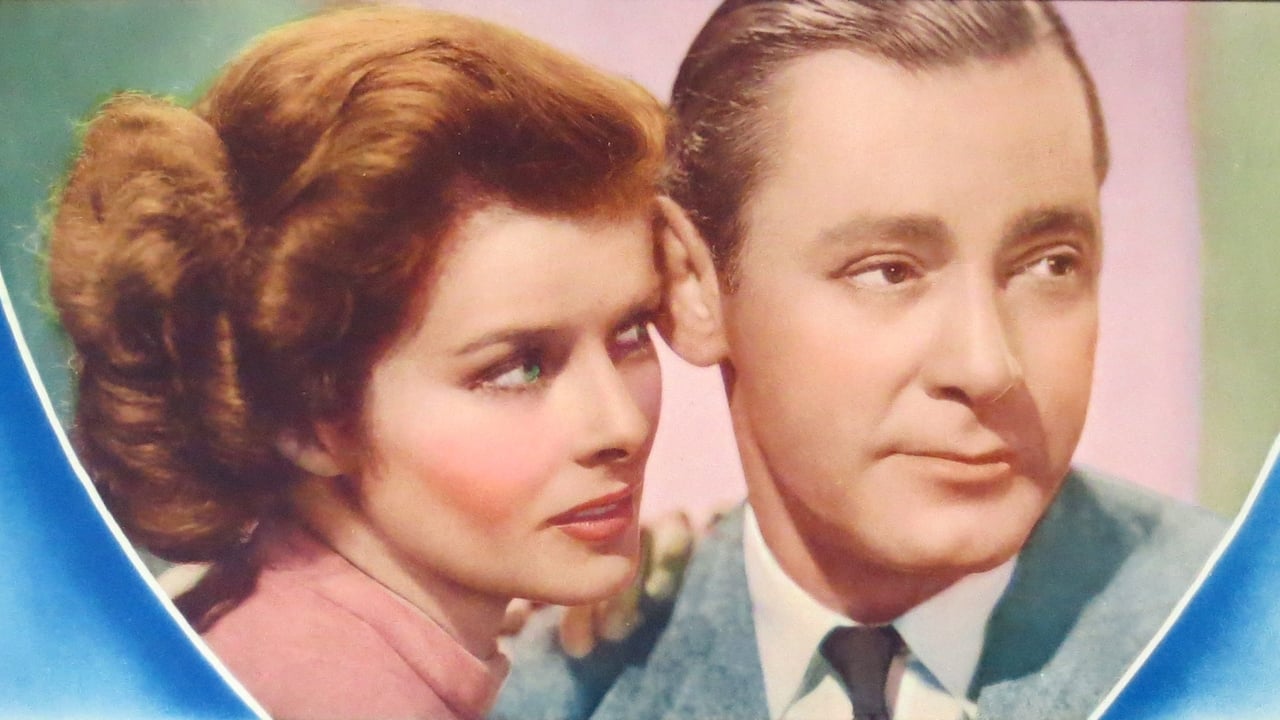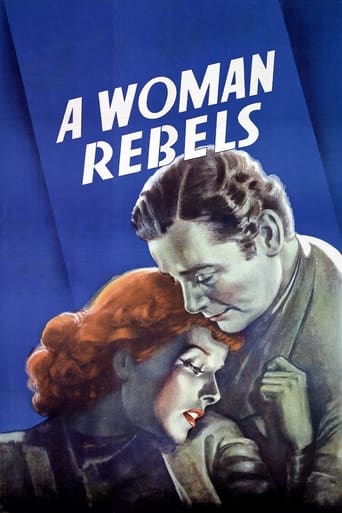

"A Woman Rebels" was a big money loser when it debuted. I think much of it was because it was a very strongly feminist film...even by 1936's standards...and most folks weren't ready to see a movie with such modern sensibilities...especially the notion of a single woman having a baby.The movie is set during the mid-late Victorian era. Pamela (Katharine Hepburn) and her sister Flora have a father (Donald Crisp) who is extremely cold, detached and loveless. He also is angry because Pamela wants more out of life than was typical of a woman of the day. She wants to read, educate herself and be something other than just a dutiful wife...and he is determined to marry her off like her sister. However, Pamela falls for a rogue and soon finds herself pregnant. To hide this, she goes to stay with Flora...and when Flora's husband dies as does Flora, Pamela pretends that her new baby is her sister's. She also does the unthinkable...she gets a job and eventually becomes a very modern and emancipated lady.This is a very well made film but as I said the notion of a single mother must have not sat well with folks. Worth seeing and among the actress's better early films.
... View MoreDirected by Mark Sandrich, with a screenplay co-written by Anthony Veiller, this above average, if dated, drama is about a young woman in (merry olde?) 19th century England who refuses to accept her position in the World imposed on her by her father. Some years later, Katharine Hepburn in the title role becomes an outspoken advocate for women's rights. The plot includes a romantic angle, or two or three, with a provocative secret which humanizes Hepburn's character and keeps it from being an offensive piece of feminist propaganda.However, audiences of the time stayed away, leading Ms. Hepburn to be famously labeled "box office poison" before she would prove her critics wrong by establishing herself as one of the greatest actresses in the history of the medium.The cast includes several familiar actors and actresses including Herbert Marshall, Donald Crisp, Lucile Watson, and Van Heflin.A young Pamela Thistlewaite (Hepburn) tells her younger sister Flora (Elizabeth Allen) not to cry when their cold and tyrannical widower father, Judge Thistlewaite (Crisp), lectures them. He insists that their homely, serious governess (Eily Malyon, uncredited) teach them that, as women, they should accept their role as subservient inferiors to men. Another live-in servant, Betty (Watson), isn't so sure and resists the Judge's "orders" in passive aggressive ways. The Judge decides it's time to introduce his daughters to society so that he can select appropriate husbands for them. Pamela tells Flora that she must marry for love and, fortunately for her, she falls for a Lieutenant Alan Freeland (David Manners) of whom her father approves.Meanwhile, Pamela is swept off her feet by Gerald Waring (Heflin). They have an affair after which Waring confesses that he's a married man, afraid to divorce his wife for the scandal which would cause his father, Lord Gaythorne, to cut off his means. So, Pamela runs away to Italy with Betty to visit newlyweds Flora and Alan, who's stationed there.On their way, Betty and Pamela embarrassingly meet Thomas Lane (Marshall), a diplomat who turns out to be a house guest of the Freelands. Pamela and Thomas spend some quality time together before he and Alan must return to duty in England and at sea, respectively. Pamela confesses to Flora her love for Waring as well as her growing physical "condition".When Flora later learns that Alan was killed at sea and conveniently falls down the stairs, ending her own pregnancy, she suggests a "solution" to Pamela's predicament before she dies: Pamela can pretend that her baby is Flora's, that she's raising it for her departed sister.Returning to England with Betty and the child, also named Flora, Pamela is pleasantly surprised by Thomas, who assists them with getting a goat (e.g. for fresh milk) aboard their boat. She then tells him that she plans on living alone and working, a foreign concept at the time. Actually, Betty lives with her, effectively raising young Flora through the years.Eventually, Pamela finds work writing for a women's magazine, which up to that point had never employed a woman! Her relationship with Thomas blossoms to the point that he proposes but, fearing a scandal which might ruin his career if anyone were to find out the truth about young Flora, she gently declines, though they remain friends through the years. The magazine she works for publishes articles about cooking and sewing until one day, when its editor (Lionel Pape, uncredited) is ill, inspired by a penniless woman in a similar predicament who kills herself, Pamela writes a scathing article about the puritanical society that "caused" it. Rushing in to stop the presses, the editor is surprised to learn that, instead of he being arrested, London's women are clamoring for more issues of the magazine. Hence, Pamela becomes the voice of the oppressed woman and is so successful that she eventually establishes her own magazine.Meanwhile, young Flora (Doris Dudley) has grown up. Irony of ironies is the fact that she falls for Gerald Waring Jr., meaning the truth of Flora's parentage is bound to come out.Perhaps the weakest part of the film is this final third act which includes a meeting between Gerald Sr. and Pamela for the first time in 20 years that leads to consequences she couldn't possibly foresee, even though its ending is decidedly upbeat if perhaps a bit too pat.
... View MoreKatharine Hepburn stars in an early feminist melodrama co-starring Herbert Marshall. The film is noteworthy for not only its lush production and excellent performances, but also the ahead of its time, and novel, depiction of women's rights and suffragists of the 19th century. Hepburn is so good she lights up the screen. Marshall, as always, delivers perfect support. The story is interesting, the cast is appealing, the sets and costumes are magnificent, the direction and cinematography are sublime, and the screenplay is intelligent and literate. Unlike many films of the 1930s, this one doesn't have a tacked on sexist ending. It's true to the women's rights cause through and through. Of all of the historical melodramas I have seen, this ranks with the best. It rises above the (condescending) 'women's picture' genre because of the timelessness of its theme.
... View MoreKatharine Hepburn shines as always in this entertaining film that tries to focus on the raise of feminism in the last mid-century. The subject is interesting enough and so is the personality of the main character, played consistently by Miss Hepburn in a mixture of strength and frailty, but unfortunately this ends being a soapy melodrama. Extremely watchable, but could have been a more relevant approach to feminism.
... View More